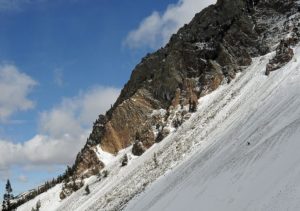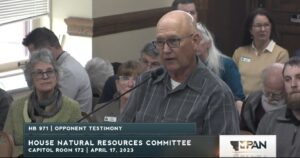By Anne Hedges
 SB 557 was described as a response to a successful lawsuit against a gold mining company in Park County. Photo by Brett French, Billings Gazette.
SB 557 was described as a response to a successful lawsuit against a gold mining company in Park County. Photo by Brett French, Billings Gazette.
Late in the session, two bills were introduced to amend the Montana Environmental Policy Act (MEPA). MEPA directly implements Montana’s Constitutional right to participate in government decision-making and the right to a clean and healthful environment. Often referred to as “The People’s Law,” MEPA is frequently the only opportunity the public has to learn about proposed projects and to provide information and feedback to a state agency before it makes a decision to approve or deny the project.
Together, SB 557 (Sen. Mark Noland, R-Big Fork) and HB 971 (Rep. Josh Kassmier, R-Fort Benton) require state agencies to ignore climate change in environmental analyses, chill public involvement, eliminate opportunities to hold agencies accountable, and create a pay-to-play system to access the judiciary. MEPA is the only state law that requires state agencies to analyze and disclose the cumulative impacts of projects or government decisions that may affect public health, fish, wildlife, cultural and historic resources, water, air, agriculture, and the economy.
SB 557 was introduced on a Monday, scheduled for a hearing late on Tuesday, and heard in an 8 am “public” hearing on Wednesday; it was no surprise that MEIC was the only opponent who was able to testify against the bill in the Senate. But that was nothing compared to the record-breaking speed of HB 971. Both the House and the Senate suspended their rules to introduce HB 971 on a Friday afternoon weeks after the deadline. The bill hearing was scheduled on Friday evening and the hearing was held on Monday afternoon. Despite inadequate public notice, more than 65 people testified against the bill at the hearing, led by Tribes and neighbors of NorthWestern’s misguided methane gas plant near Laurel. Only a handful of industry and union representatives supported it. The Senate hearing was similar. Despite only being given one day’s notice, scores of people from across the state testified against it. The deck was stacked, but people came out to defend their constitutional rights.
Under SB 557, if agencies such as the Montana Departments of Environmental Quality or Fish, Wildlife & Parks, fail to comply with MEPA, the public would face overwhelming financial penalties to go to court in order to require agencies to follow the law. SB 557 prevents agencies from considering climate impacts when analyzing the environmental, social, and economic impacts of proposed projects. It requires someone challenging a MEPA decision to file an injunction against the project and post a bond – a burden that likely interferes with their constitutional right to seek judicial redress. It requires the challenger to pay the agency to provide “the administrative record” in order for the court to have a record of the agency’s rationale for making the decision. And it limits a person’s legal claims to those issues that it raised in comments on the agency’s draft decision even if the final decision and analysis differ significantly from the draft. While the bill was even more objectionable as introduced, the final product remains a direct attack on the public’s right to oversee government.
HB 971, as introduced, held a gun to the head of the judicial branch. It originally said that if the Montana Supreme Court ever ruled that state agencies had to consider the climate impacts of projects in environmental reviews, then all coal, hardrock, and opencut mining permits would be exempt from MEPA. That provision was removed on the House floor. What remained was a prohibition against all state agencies, including the Montana Department of Environmental Quality (DEQ) from considering climate change when approving projects that could impact the environment.
HB 971 is intended to overturn a Yellowstone County judge’s decision that DEQ had failed to disclose the climate impacts and harm to the neighbors’ quality of life when it issued an air permit for NorthWestern Energy’s Yellowstone County Generating Station (YCGS). YCGS is a 175-megawatt methane plant on the banks of the Yellowstone River near Laurel (see article).
Climate change is already having profound environmental, social, and economic impacts on Montana, and those impacts are projected to get worse and more expensive:
- Montanans have faced record floods, devastating droughts, impaired health, and lost economic opportunities due to wildfires and smoke.
- The Montana Climate Assessment, authored and compiled by some of Montana’s leading climate scientists, showed that these impacts will increase in intensity and harm to public health, agriculture, water resources, and more.
- A Montana Farmers Union study showed a potential $736 million impact in coming decades to Montana’s agricultural sector due to projected changes in temperature and precipitation.
- Montana’s outdoor economy could lose more than $1 billion dollars over time due to climate impacts from such things as wildfires, drought, and changes in precipitation and temperatures, according to economist Dr. Thomas Power.

Steve Krum was one of several Laurel residents who testified multiple times against the bad MEPA bills.
Both bills are intended to stop environmental groups from challenging agency decisions in court. But MEPA decisions have been challenged by a wide array of Tribal interests, individuals, and organizations across the political spectrum. The Northern Cheyenne Tribe, the Assiniboine and Gros Ventre Tribes, and the Fort Belknap Community Council have challenged various state agency MEPA decisions in an effort to protect water quality. Conservative organizations including United Property Owners of Montana, Park County Stockgrowers Association, and Citizens for Balanced Use have challenged MEPA decisions in an effort to protect property rights. Agricultural interests, such as the Tongue River Water Users Association, have challenged MEPA decisions to protect agriculture’s access to clean water. The conservative Jefferson County challenged a MEPA decision to protect area residents from a perceived threat due to a transmission line. The list goes on. All sides of the political spectrum want an opportunity to hold agencies accountable when they perceive those agencies interfering with their rights.
While the immediate future of robust environmental analysis under MEPA is murky, a rigorous defense of MEPA and its importance in protecting Montanans’ fundamental rights is not. MEIC will work with our partners, members, and allies to defend our right to know what government officials are doing, to guarantee that our members and the public have a voice in the process, and to protect our right to a clean and healthful environment despite whatever polluters and their cronies in the Legislature throw at us.
This article was published in the June 2023 issue of Down To Earth.

